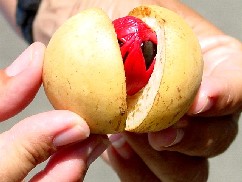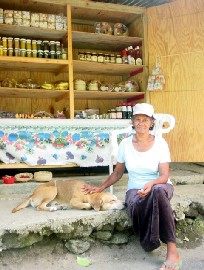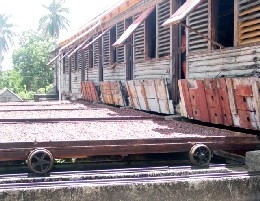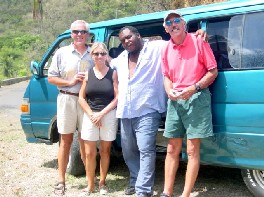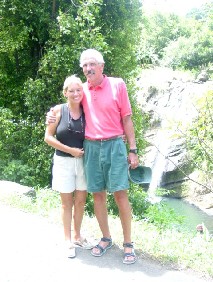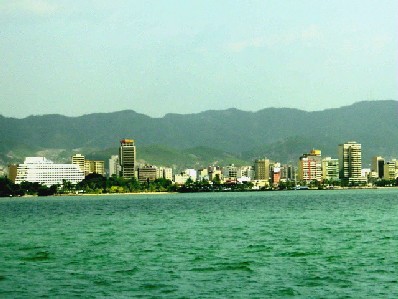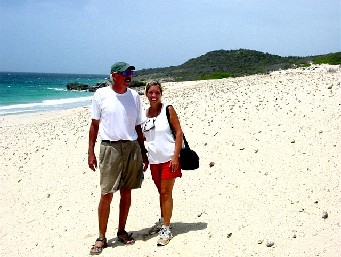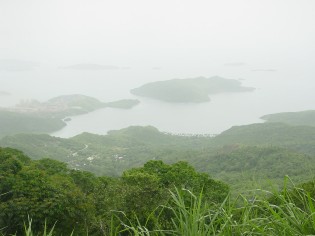|
| |||||||||||||||
| |||||||||||||||
|
10 June 2003
Prickly Bay, Grenada West Indies N 11.5991 W61.4569l
Thank You
I know that most shoppers over the age of thirty-five are reminiscent for the days when clerks and sales personnel actually said "Th
Of course it is sometimes difficult to even engage a clerk to wait on you especially if they are talking to another clerk and if that other clerk is from the opposite sex, well find another store. This is not just young people who I now identify as 25 or under but it comprises the entire generational spectrum. So is it cultural or could it be geographical, I don't know? But I do know that major resorts such as Hilton and Marriott opening facilities in the Caribbean have to do extensive training in politene
The juxtaposition to this lack of interest in your business are the buses of Grenada. These new minivans are for the most part painted red and run the island up and down picking up people along the way or queuing up at designated places around the island such as the open air market. We marched up and down the hilly region of St George's until we found the market and were swept into a van that claimed to be headed in the direction we wanted to go. There were two seats left, one in the last row and the jump seat in the next to last row. We were headed for the Venezuelan Embassy and were not certain how far from the market it might be. In the back of the van we sat shoulder to shoulder with the other occupants in silence. In such closeness it is impossible to carry on a conversation, much like being in a crowded elevator. Even though you may enter the elevator talking to an acquaintance, suddenly you both fall silent until you exit the elevator. It was hot that day and the humidity was high and the smell of Spice Island was more like Perspiration Island. These buses are manned by a driver and a conductor or what is better termed a hustler. It appears that the job of the hustler is to ask every pedestrian no matter what direction they may be headed if they need a ride. One lite
As our bus headed up a 45 degree hill a young lady along the roadside indicated that she needed a ride and even though there were no seats available the driver pulled over and a pillow appeared that spanned the inch and a half between my jump seat and the bench seat and room was made. Now not just shoulder to shoulder but also cheek to cheek, the van swerved and swayed on the left side of the road and we could only wonder if they knew the location of the Venezuelan Embassy or if they understood what our destination was at all. We continued up the hill higher and higher with the sun in our eyes and finally through the smudged windows we could see the Venezuelan flag waving. The van came to a screeching halt and after six people unloaded we made our way out and paid. All of this for 1.50 EC each or about $.56 USD but no "Thank You".
We were drenched in sweat and happy to be at the embassy. Grenada produces a wide array of spices most of which seem to grow wild except for sugar cane and bananas. The three major commercial crops on Grenada are cocoa beans, bananas, and nutmeg. Cocoa trees produce pods the size of a softball and the beans from inside the pods are dried in the sun and sold to the large international chocolatiers. Grenada does have its own chocolate factory and you can buy "Grenada Chocolate" bars in most shops around the island. Also on the drying tables are nutmeg, cinnamon, bay leaves, mace, curry, basil, clove, and other less recognizable spices. In the picture above you can see the drying tables filled with cocoa beans . At night or when it rains the tables are rolled under the processing plant where the beans can stay dry. "Nutmeg apples" grow on fairly large trees and once the fruit splits, the nutmeg falls to the ground and is collected for processing. The red layer of the nutmeg is dried and packaged as mace, what we use in pumpkin pies. It is also sold to cosmetic companies and used in lipstick products. To help in creating jobs the government is trying to encourage the production of "value added products" such as nutmeg jellies and jams. One product that tourists seem to be attracted to is a ru
It is the time of the year that islanders "turn down their cooking pots" since mangos are ripening all over the island and this abundant food source is there for the picking. Coconuts are also plentiful and the fish markets have a good supply meaning weekend anglers must be doing well . In Grenada the GDP per person is low at $2300 but the incidents of poverty appears to be very low. Well, we want to take this opportunity to thank you for reading our web. It may at times appear to ramble but that is due to the fact that it is never written at one sitting and can span several weeks of events and pictures.
...............................but since it doesn't cost you anything, heryago.
25 June 2003 Puerto La Cruz, Venezuela N10.1185 W064.4050
The Thorny Passage
Well here we are in Venezuela docked at the Maremares resort. After eight months of no TV, no internet, no telephone, no air conditioning and strict water and power conservation, add to that staying up at night to make sure your anchor isn't dragging, worrying about how full your holding tank is and how many more days you need to wait for weather and where are you going you get the part you need; we are at a destinati
We are uncertain where we decided to make the right turn from our original destination of Trinidad to Venezuela but we think it was somewhere in Antigua where we met a Welshman that just couldn't say enough about the beauty of the island of Margarita and the low cost of living. We later found out that Gordon's assessment was a bit bias since he had just married a Columbian lady living in Margarita . At about the same time we received a quote from the Crews Inn Marina in Trinidad and the price for dock space was double for catamarans. We thought that unfair so we started to investigate the possibilities of Venezuela. The strikes that plagued the country last year creating shortages of food and fuel in some areas had most cruisers steering clear. Although almost everyone we meet that is headed
Early sailors from Columbus to the British Admirals Rodney and Nelson, merchant ships trading mostly in slave trade, Dutch settlers and oh yeah those French guys referred to the trip we recently completed from the US as the Thorny Passage. Uncharted water and hurricanes provided them with many ways to find trouble and to endanger their vessel. Today with the advent of the GPS, radar and improved but not perfect charts the dangers are diminished but the adventure is still there. We have traveled over 1700 miles via a direct route and probably some 2500 miles over the ground. This distance was covered during the last eight months which means that we moved the boat less than 10 miles per day even though on a bad 24 hour day we should make about 120 miles. Of course the reality of the situation is that most of our passages have been from one island to the next most southern island a distance that is typically less that 50 miles. After such short passages we take a week or so to explore the islands we like or wait for the next weather window. The Montserrat Volcano Observatory tells us that islands that lie in an arch like many in the Windward and Leeward have been formed by volcanoes. This provides lots of deep water reducing the probability of running aground but increases the difficulty of anchoring. There are also islands with a great many sand bars and coral reefs to contend with and all in all the experience is a good beginning test of our seamanship. After leaving the BVI we were on the hook every night but one and some days we anchored twice, once to check in and a second time to spend the night. And I do remember many times anchoring several times before getting it right.
Today we know the boat well and in retrospect we didn't know enough when we started out but that was the idea of this passage as a search for knowledge. We made a number of bone head mistakes but none that endangered our boat or others but just added to our frustration and sharpened our trouble shooting skills. We can change fuel filters underway in the dark, read our radar, fix an under performing watermaker, catch our dinner, forecast weather and set an anchor that will hold in a pretty good blow.
Most of our companion boats are safely at dock or on the hard in Trinidad, Grenada or Venezuela and most of the owners and crew will return to the US or Europe sometime during hurricane season. For now we'll do a little traveling in Venezuela, make a few boat repairs and improvements, study Spanish and enjoy.
|

